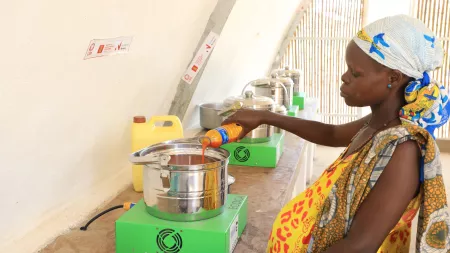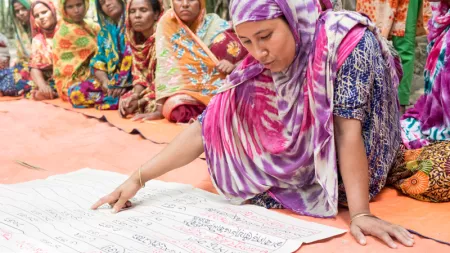The importance of community-based adaptation
Most of CARE International’s Climate Justice work is focused on adaptation. This means building the ability of individuals and communities to better withstand the impacts of the climate emergency.
We support communities to anticipate the adverse climate impacts, helping them to take appropriate action to prevent or minimize damage caused. This work is critical to protecting millions of people who are at risk of losing their lives and livelihoods because of the climate emergency.
Community-based adaptation requires a holistic approach that brings together traditional knowledge with innovative actions that not only address current vulnerabilities, but also build people’s capacity to cope with uncertainties and challenges.
Only by addressing the root cause of inequality, such as unequal power relations and access to decision-making, can vulnerable people identify and implement solutions that serve their needs best.
How CARE International is helping communities adapt to the climate emergency
Our approach to adaptation focuses on community-based projects and integrating climate emergency adaptation practices into our other areas of work, such as food and nutrition security.
The four main areas of CARE International’s Community-Based Adaptation framework are:
- Promotion of climate-resilient livelihoods strategies
- Disaster risk reduction strategies to reduce the impact of hazards on vulnerable households
- Capacity development for local civil society and government institutions
- Advocacy and social mobilization to address the underlying causes of vulnerability
Although community-based interventions are situated at the local level, it is crucial to recognize that community-based adaptation also demands action at national, regional and global levels in order to achieve systemic and long-term change.
CARE’s community-based adaptation framework provides a holistic approach for communities to plan adaptation actions that are informed by climate science as well as by local observations of climate change. It helps local civil society and government institutions to better support communities’ adaptation efforts. It also addresses underlying causes of vulnerability, such as poor governance, gender inequality, or overuse of resources by influencing the policy and enabling environment.
Addressing gender equality in our climate emergency response
Integrating gender equality and women’s empowerment approaches into our climate change programs ensures that adaptation outcomes are effective and sustainable. It also helps monitor project activities to ensure they do not unintentionally exacerbate other inequalities and vulnerabilities, and that they are targeted correctly in ways that fulfill the specific needs of the most vulnerable groups.
Our community-based adaptation approach promotes the equal participation of men and women in the decision-making and implementation phases of activities, creating lasting transformative change in gender relations within the whole community.


